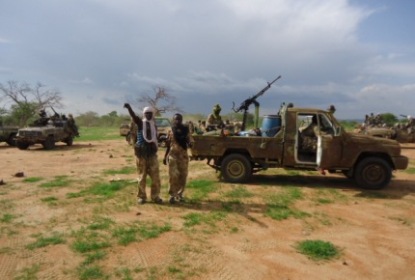Juba denies Sudan rebels involved in South Sudan conflict
February 22, 2014 (JUBA) – The South Sudanese government has strongly dismissed reports alleging that is was harbouring Sudanese rebels in the country to help it fight dissent forces loyal to its former vice-president, Riek Machar.

The presidential spokesperson was reacting to an article published on Sudan Vision, a government newspaper, Saturday entitled “Juba, Sudanese Rebel Movements, What Then”. The article said Sudanese rebel groups now want a recompense after taking part in the fight against Machar’s forces.
“The important question what is the future of the Sudanese rebel groups which fought along the South Sudanese government? The Sudanese rebel movements are waiting for political reward from the South Sudanese government for engagement in the fighting”, said the report.
“Actually we do not want to point fingers though we believe the rebels of Riek Machar are getting foreign support,” he added, stressing the significance of the September 2012 Cooperation Agreement between Sudan and South Sudan.
“We cannot do that,” the spokesperson said, denying that his government provides any support to the Sudanese rebel groups. He stressed that the two countries have agreed to work together for peace and stability for the mutual benefits and other interests to their citizens and the region.
“If we want foreign support from foreign forces as an independent state, and we think Sudan is the right country, we will approach the government of Sudan as we did with the government of Uganda for military supports,” he said.
Sudan, despite its previous accusations against Juba, announced its support to the elected president Salva Kiir. The Sudanese President Omer Al-Bashir visited Juba on 6 January where he announced his support to his South Sudan counterpart.
However Khartoum has shown some frustration from the presence of Ugandan troops in the South Sudan. Museveni is seen as seeking to destabilise Bashir’s regime. Kampala harbours the Sudanese rebel groups and accused of providing them military training and weapons.
The South Sudanese rebels during the past weeks accused the Sudanese Justice and Equality Movement of participating with the SPLA forces in the recapture of the capital of Unity state, Bentiu. But JEM rebels strongly dismissed the accusations.
The spokesperson of South Sudan army (SPLA) equally refuted allegations of being supported by Sudanese rebels, describing them as “unfounded statements on rebel propaganda”
“The Sudanese press should observe the growing relations between the two countries and report accordingly. They should not rely on the media reports based on propaganda statements by the rebels about the alleged presence of the Sudanese rebels,” Col. Philip Aguer told Sudan Tribune.
“First of all, we have said time and again that there are no Sudanese rebels in the Republic of South Sudan, let alone the unfounded allegations that they are fighting alongside us. The rebel themselves have issued repeated statements clarifying these allegations, yet the Sudanese press continue to ignore these for reasons best known to them”, he added.
The military officer did not, however, hint on whether South Sudan government would request an explanation from Sudanese authorities about persistent reports that its army provides support to Machar rebels currently fighting forces loyal to President Kiir.
Since the start of the inter-South Sudanese crisis in December 2013, many foreign officials urged both sides to halt military hostilities and settle the conflict peacefully.
Many hands pointed to the eventual involvement of the Sudanese government as the South Sudanese oil production is shipped through Khartoum.
Last December, Machar said oil production would not be stopped and pledged to place revenues from oil in an extra account until the conflict is over.
Some analysts went to say that the rebel leader would seek to struck an alliance with Khartoum to ensure continuation of oil exportation to save it’s troubled economy.
However, since the Juba army regained control of oil areas in Unity and Upper Nile state, the oil field have remained in the hands of government forces.
Bashir and Kiir discussed in their meeting of January ways to ensure the continuation of oil flow through the Sudanese pipeline, but the two sides dismissed reports about the deployment of a joint forces to protect the production fields.
Fighting between the South Sudanese government troops and the rebels has displaced hundreds of thousands of people since December last year. Several lives have also been lost.
Also talks between the two rival factions hit a deadlock early this week after it emerged that the rebels opposed to the leadership had taken full control of Malakal, the strategic Upper Nile state capital, located about 497km north-east of Juba.
(ST)
